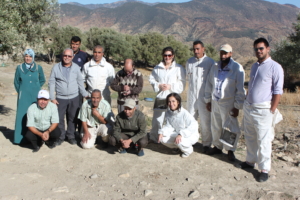In the province of Taza in Morocco, a provincial union of beekeeping cooperatives, Upat, continues its dynamic development and activities in favour of beekeeping and its members. Supported by Fert since 2014 under the Sfoap programme, these still modest collective actions, however, show a real willingness to act together to solve the recurrent problems encountered by beekeepers in the province.
Among its priorities, this young union created in 2012 included the supply of quality inputs and queens to its hundred or so members: local recycling wax, animal health products, hives, queens, etc. The new union was created in 2012. In an area that remains culturally very attached to community organization, the small cooperatives that are members of the union are highly motivated to set up services that will benefit everyone: once the equipment is built and ready to operate, this service for the supply of quality products will be effective in 2019.
Several advantages have been pointed out by the members of the union in setting up this service: better quality and cost of products and services – in particular on queen genetics, collective price negotiation, local recycling of wax, etc. – have been pointed out.
At the same time, technical advice will be provided to beekeepers, half of whom are women. A technical committee composed of 4 beekeepers who are members of the union has been set up to manage the various services offered and accompany the members. A beekeeping nursery of 100 hives has already been in place since 2017, with a real start of queen production and multiplication planned for 2018. The president of the union, active within the inter-professional Fimap, intends to have the quality of their hives and technical training recognised by this means.
And other ideas are already in the making! For example, the promotion and valorization of honeys, to be initiated in 2019.
As part of an IFAD supervisory mission, a short explanatory video was produced. President Larbi Eladdouni presents the projects of his organization from a honey extraction unit recently brought up to standard.



